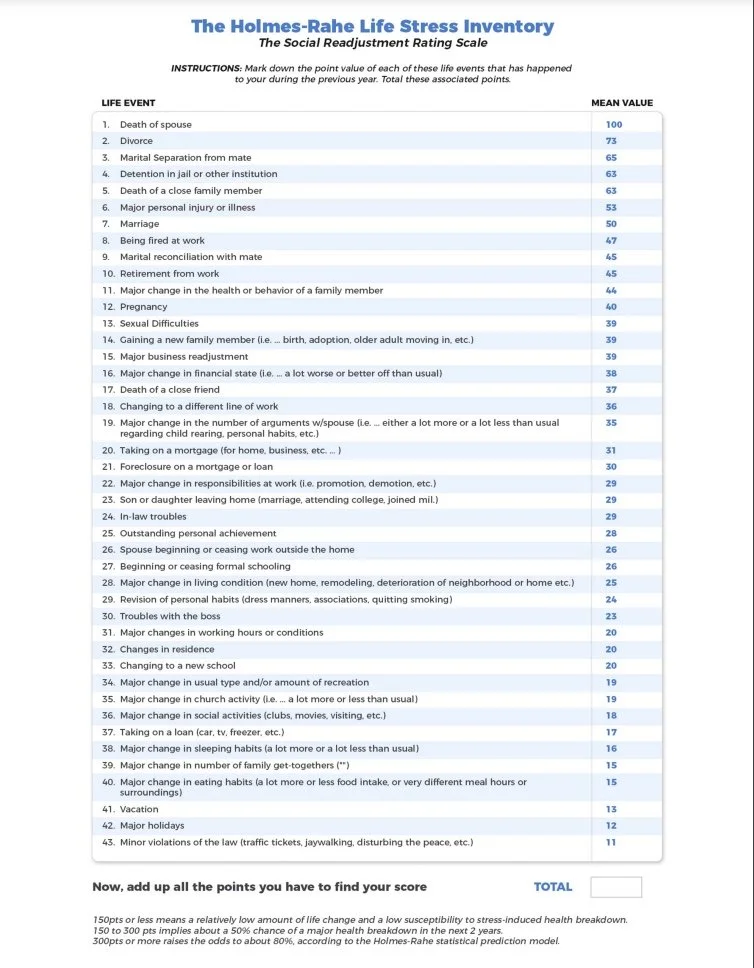A Stress Strategy That Actually Helps
It’s no secret that we’re all under ‘a lot of stress’, and that people’s “adrenal’s are shot,” right? But golly, I’ve never seen any discussion that actually feels related to a busy parent’s life and responsibilities!
Adrenal deficiency is a very real effect of the modern life we’re living, and the consequences include symptoms that are now rampant among my midwifery clients, such as disrupted sleep, anxiety, racing thoughts, heart palpitations, allergies, elevated blood pressure, depression, headaches, and decreased tolerance to stress, just to name a few. The very good news is that real change can be felt quickly through precise supplementation and small changes made with awareness.
The first step is to have a new understanding about the scope of stress that is our life - let’s start with this fascinating ‘stress inventory’ that you can take right here!
The Holmes-Rahe Life Stress scale was developed in 1967 as part of an extensive medical study that found that positive changes in our lives as well as negative ones require adjustment of our biological systems. They concluded that scores at certain thresholds reflected increased health risks in quite specific ways, I’ve found that it’s very eye-opening to have a number put to our experiences. So - read the list now and jot down your score for your life-changing events over the last two years. (The original instructions were for two years, though the version below suggests one.)
This chart is from https://www.stress.org/holmes-rahe-stress-inventory
Before I share the scoring, I’d like to point out that a ‘Pandemic’ was not even listed! You alone know to what degree you experienced stress in the last few years, so pick your points relative to other events above. I suggest that you add in some points for living through the pandemic in general, points if you visited someone in the hospital during Covid, if you had mask conflicts in your community (either way), if you had supply chain challenges, if your work was affected (more stressful/moved to remote etc), if you lost someone close, if your children’s schooling was changed (remote/home etc), if contact with your extended family was changed, if your finances took a hit, if your loneliness increased… See where I’m going?
Also - you birth workers - I suggest adding points here as well! I figured if Christmas (or other significant holiday) was a 12 point addition, I added in 5 points for every birth, 10 points when I missed a night’s sleep, and 25 points if I had to resuscitate a baby or handle a serious complication. You know what are your stressors.
Official scoring:
150 points or less | a relatively low amount of life change and a low susceptibility to stress-induced health breakdown
150 to 300 points | 50% chance of health breakdown in the next 2 years
300 points or more | 80% chance of health breakdown in the next 2 years, according to the Holmes-Rahe statistical prediction model.
What does your score look like? I frankly have yet to meet anyone who’s score is even as low as 300 points, which this model found represents a significant health threat. The good news is that you can use something like this is to strategize the events you DO have control over. For instance, if you know in the coming year you’ll be moving a parent into a nursing home, and your youngest is graduating from high school, maybe it’s not the year to also volunteer as the head organizer of an event?
The first time I took this test about a decade ago, I scared myself like crazy because my score was over 700! However, the power in it was that I realized that to continue to be around in good form to raise my kids, I absolutely had to prioritize my health. In my case, I became far more willing to support my health through budgeting in supplements (and then actually taking them!), and made room to meditate daily instead of ‘when there was time.’ It doesn’t necessarily mean your entire life patterns have to change; it does mean that your new visceral understanding can motivate you, even in the face of overwhelm, to increased self-care of some kind. Your longevity and quality of life will be greatly enhanced!
The first step to healing the symptoms of stress and adrenal dysfunction are a clear understanding of the scale of the issue. In future blogs I’ll cover the stages of adrenal deficiency, some healing approaches in both lifestyle and nutrients, and how you’ll know you’re making progress. (You might want to have other adults in your household also start with this test!)


